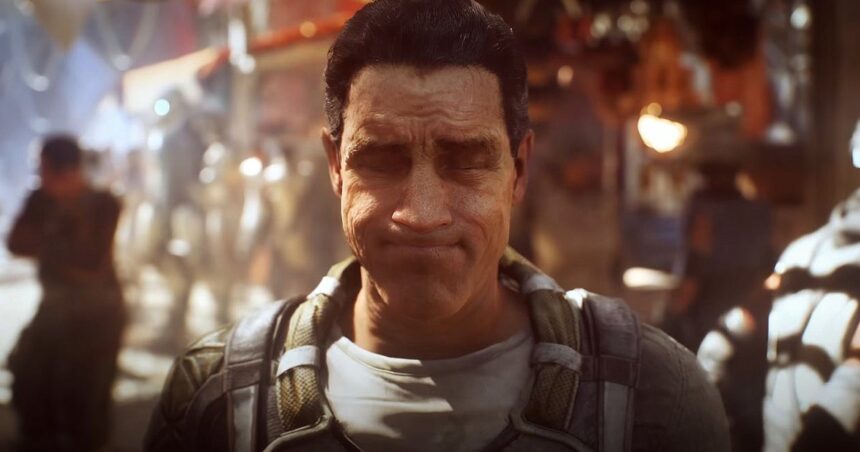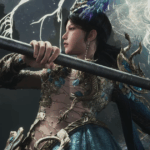Even Anthem was exciting once. It’s easy to forget now EA has sentenced BioWare’s multiplayer shooter to the gallows, but there was a moment in time where the gaming world watched the reveal of Anthem with bated breath. What we were seeing wasn’t Mass Effect or Dragon Age, these series the studio had clung to for so long, but something brand new. And for a moment, it dazzled. For a moment Anthem looked like the future.
Let me take you back to E3 2017, to an old way of doing things. It’s the E3 we once knew, pre-Pandemic, a show full of bombast, ambition, and huge marketing budgets. We’re on Microsoft’s coveted stage as lights flash and screens project the future of Xbox. We’ve just had a release date for the Xbox One X; the Xbox Series consoles are still a closely guarded secret for now. But it isn’t the biggest announcement of the night. The show will be closed by a game instead – a game EA executive Patrick Soderlund comes onto the stage to introduce.
“New IP is the lifeblood of our industry,” he says, beginning some signature E3 executive waffle. “It’s also risky. At EA, we have teams [spinning] up a lot of projects and only the greatest will make their way to you. And that’s okay, it’s all part of the creative process. And it’s worth it, because when you find something special, there’s no better feeling as a developer than introducing players to a brand new world. And as a player, there’s no better feeling than losing yourself in a completely new experience.
“Our developers at BioWare have been creating something truly special,” he continues. “A huge open world that is lush, savage, mysterious and ever changing, filled with interesting characters and new types of gameplay you’ll enjoy with your friends for years to come.” (I bet he wishes he hadn’t said that.) “This is what’s possible. We take an extraordinary vision and combine it with the latest technologies and hardware. Amazing concepts become possible. Great ideas become reality.”
Then, in that classic E3 way, he says what we’re about to see is running on actual console hardware, Xbox One X in this case, and leaves the stage. Anthem game director Jon Warner replaces him. The presentation begins. Silence and anticipation fill the cavernous hall.
It’s a moment I can still see in my mind, the way that hand reaches in-game to pull back that thin but miraculously concealing piece of fabric back, to reveal the bazaar-like market stalls beyond. That bright burst of light that meets our eyes. The way the dusty air catches the shafts of sunlight breaking through the overhead cover to hit the sandy floor below. All the people milling around. The density of the scene, the detail. And I remember thinking, when that concerned-looking character barrelled up to the camera to talk to us, that this is what it would feel like playing the game, having the many BioWare conversations in the game we inevitably would have. Seeing the pores and the weathered grooves of the faces we were talking to. The next-gen-ness of it all. It looked great.
Then the exosuit, the mech, the Javelin. The vessel of adventure. And the way the back of it yawned open to welcome us, to invite us in, and the ridiculously lavish animation and detail that accompanied this process, as we clambered first one foot and then the other inside, into the padded interior (someone had clearly considered how comfortable it would be). Then the first glimpses of the game’s jungle world, from that high-up platform, wondering ‘how will we get down?’, and gasping as we found out – as the player jumped from the ledge into brief nothingness, before hurtling like a missile towards the floor and through the undergrowth. Detail everywhere: vines, herds of strange honking animals, colourful plants, a roaring King Kong-like beast bursting into the scene from somewhere. Then being underwater and thinking: wait, we can explore here too? Even the shooting looked good. Solid, meaty, with impressively explosive special powers.
Such was the overall effect of the trailer I didn’t even mind the scripted banter (E3 bingo card rapidly filling up!) as ‘friends’ logged in, thumping seamlessly down into our game. None of it could dissuade me at that point. The show closed. The gaming world exhaled. Didn’t Anthem look good?
Yes. In fact from this reveal trailer at least, even eight years later it does. You could put that presentation in a State of Play broadcast today, or an Xbox Direct, and it would stand out. That probably says a lot about how representative of actual gameplay it was, but at the time it didn’t matter. Being accurate wasn’t the point. It was far more important to sell the dream and to whip up belief for the 10-year masterplan EA and BioWare had for the game. Realism was a secondary concern to emotional buy-in. They wanted our hearts, not our heads. And for a moment, they had them.
I miss that feeling. I miss being giddy at the prospect of a new game, those moments during old E3s when executives stepped on stage to sell us the gaming equivalent of snake oil. Todd Howard dropping Elder Scrolls 6 on us in that Bethesda showcase in 2018; Peter Molyneux selling the incredible potential of Project Natal (Kinect) in 2009; Sony announcing PlayStation 3 with its incomprehensible Cell architecture that may or may not be magic. The vapourware of Beyond Good & Evil 2. Intangible potential we can never quite grasp because it’s never quite real, but which feels terrifically exciting because of it. Tomorrowland. Technology to excite the soul. When was the last time you felt that? When did we get so sensible?
I realise there’s a reason for it. It’s the natural consequence of games promising the moon but delivering wheels of cheese, which has led us to a place where we, the people fed these promises, are fed up. Where “bullshots” – I love that term – and pre-rendered trailers have become as transparent and suspicious as the promises aired in them. There’s been backlash and developers have been burned by it. CD Projekt Red will forever remember the painful “downgrade” discussions around The Witcher 3, for example, which does make the recent Witcher 4 presentation rather curious.
To me, that was a glimpse of a game reveal of old: a futuristic demonstration of technology we don’t widely see utilised in games yet. Was it real? Time will tell, I suppose. But so scorched have fingers become that few game-makers seem brave enough to dream publicly any more, for fear of eventually being caught out.
EA and BioWare were caught out, I suppose. Reality came due and Anthem was revealed for what it was, and what it wasn’t. It couldn’t be avoided forever. And again, that’s probably for the best. But for a moment there, a brief heartbeat of time, the dream of Anthem was alive.





